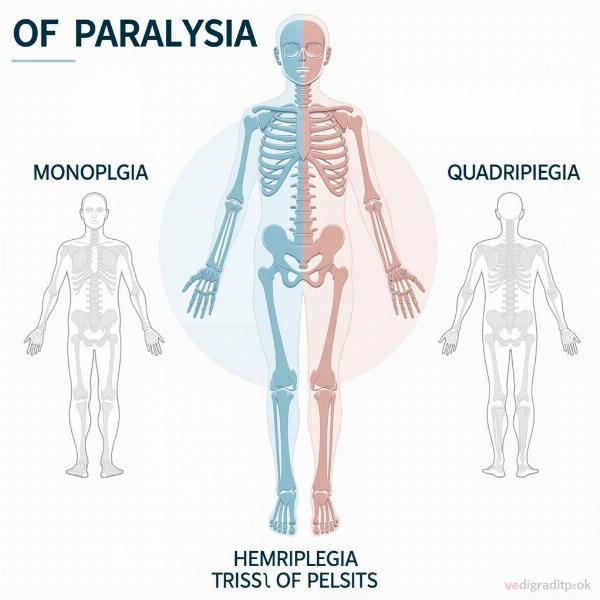Paralytic, a term often encountered in medical and colloquial contexts, carries significant weight. Understanding its meaning in Hindi, along with its various nuances and implications, is crucial for clear communication. This article explores the paralytic meaning in Hindi, providing detailed explanations, synonyms, and contextual usage examples to ensure a complete understanding.
What Does Paralytic Mean in Hindi?
The Hindi translation of “paralytic” most commonly used is लकवाग्रस्त (lakvāgrast). This term directly refers to someone afflicted with paralysis. Another frequently used term is पक्षाघात (pakshāghāt), which literally translates to “half-body stroke” and often refers to paralysis affecting one side of the body. While both terms convey the general idea of paralysis, understanding the subtle differences in their usage is important. For example, lakvāgrast emphasizes the state of being paralyzed, while pakshāghāt often points towards the cause (a stroke).
Other terms that can be used to describe paralysis in Hindi, depending on the specific context, include:
- अंगघात (angghāt): Paralysis of a limb.
- चेष्टाहीन (cheṣṭāhīn): Motionless, inactive, without movement.
- निश्चेष्ट (niścheṣṭ): Still, motionless, inactive.
These various terms offer a more nuanced understanding of the different forms and degrees of paralysis.
Understanding the Nuances of Paralytic in Hindi
The word “paralytic” can be used both as an adjective and a noun. As an adjective, it describes something that causes paralysis or relates to it. As a noun, it refers to a person suffering from paralysis.
- Adjective: The venom of some snakes can be paralytic (लकवाकारी – lakvakārī).
- Noun: He became a paralytic after the accident (लकवाग्रस्त व्यक्ति – lakvāgrast vyakti or पक्षाघाती – pakshāghātī).
 Effects of Paralysis
Effects of Paralysis
Common Causes and Types of Paralysis
Understanding the various causes and types of paralysis is essential when discussing the term “paralytic.” Some common causes include:
- Stroke: A leading cause of paralysis, often resulting in hemiplegia (paralysis on one side of the body).
- Spinal cord injury: Damage to the spinal cord can lead to paraplegia (paralysis of the lower body) or quadriplegia (paralysis of all four limbs).
- Multiple sclerosis: This autoimmune disease can cause a range of neurological symptoms, including paralysis.
- Cerebral palsy: A group of disorders affecting movement and muscle tone, often leading to paralysis.
How is Paralysis Treated?
Treatment for paralysis varies depending on the cause and severity. It can involve:
- Physiotherapy: Exercises and therapies to improve muscle strength and function.
- Occupational therapy: Adaptive strategies to perform daily tasks.
- Medication: To manage underlying conditions or alleviate symptoms.
- Surgery: In some cases, surgery may be necessary to repair damaged nerves or tissues.
Conclusion
Understanding the “paralytic meaning in Hindi” requires more than just a simple translation. It involves grasping the different terms used, their nuances, and the various contexts in which they are applied. This article provides a comprehensive overview of “paralytic” in Hindi, empowering you to communicate effectively and sensitively about this important topic.
FAQ
- What is the most common Hindi word for “paralytic”? लकवाग्रस्त (lakvāgrast) is the most common term.
- What does pakshāghāt mean? It refers to paralysis affecting one side of the body, often caused by a stroke.
- What are some other Hindi words for paralysis? Other terms include अंगघात (angghāt), चेष्टाहीन (cheṣṭāhīn), and निश्चेष्ट (niścheṣṭ).
- What are the common causes of paralysis? Stroke, spinal cord injury, multiple sclerosis, and cerebral palsy are some common causes.
- Is paralysis treatable? Treatment options vary depending on the cause and severity, and can include physiotherapy, occupational therapy, medication, and surgery.
- How can I learn more about paralysis in Hindi? Consulting medical resources in Hindi and speaking with healthcare professionals can provide further information.
- What is the difference between lakvāgrast and pakshāghāt? While both refer to paralysis, lakvāgrast emphasizes the state of being paralyzed, while pakshāghāt often implies a stroke as the cause.
Meaning-Hindi.in is your trusted partner for professional Hindi translation services. We specialize in various domains, including business, legal, technical, website localization, and academic translations. Our team of expert linguists ensures accurate and culturally sensitive translations to meet your specific needs. Whether you require translation of business documents, legal contracts, technical manuals, or educational materials, Meaning-Hindi.in is here to assist you. Contact us today for a seamless and reliable translation experience! Email: [email protected], Phone: +91 11-4502-7584.